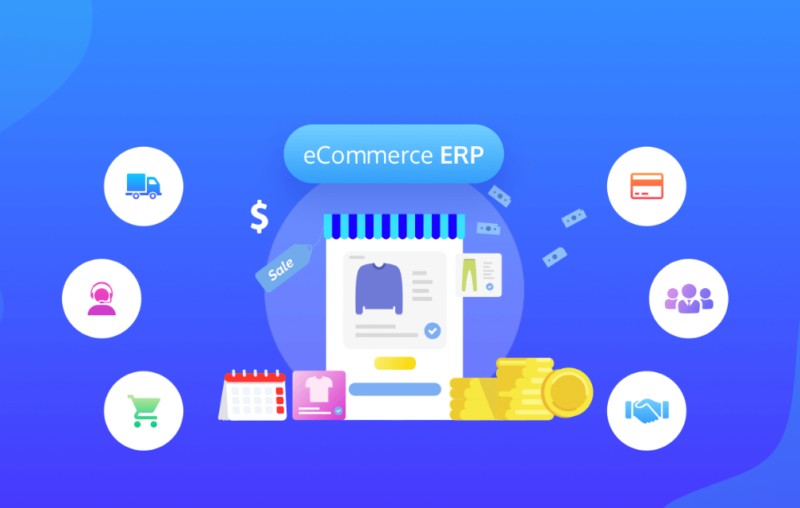ERP (Enterprise Resource Planning) systems have long been associated with large corporations, but their benefits extend to small businesses as well. In today’s competitive landscape, small businesses need to operate efficiently and effectively to stay ahead.
This article explores the significance of ERP for small businesses, its key features, implementation considerations, popular systems, case studies, challenges, implementation tips, and future trends.
Importance of ERP for Small Businesses
Small businesses face unique challenges in managing their operations, often with limited resources and manpower. Implementing an ERP system can significantly enhance their ability to streamline processes, centralize data management, and achieve cost efficiency.
Streamlining Operations
One of the primary benefits of ERP for small businesses is streamlining operations. By integrating various functions such as finance, inventory, sales, and human resources into a single platform, ERP eliminates duplicate data entry, reduces manual errors, and improves overall efficiency.
Centralized Data Management
Small businesses often struggle with scattered data across multiple systems and spreadsheets, making it difficult to access real-time information. With ERP, data is centralized, providing stakeholders with accurate insights for informed decision-making.
Cost Efficiency
Contrary to popular belief, ERP systems are no longer prohibitively expensive for small businesses. Many vendors offer affordable solutions tailored to the needs of small enterprises, allowing them to achieve significant cost savings in the long run through improved efficiency and productivity.
Key Features of ERP for Small Businesses
ERP systems for small businesses typically offer a range of features tailored to their specific needs:
Inventory Management
Effective inventory management is crucial for small businesses to avoid stockouts, reduce carrying costs, and improve cash flow. ERP systems help automate inventory tracking, forecasting, and replenishment, ensuring optimal stock levels at all times.
Financial Management
Managing finances is a top priority for small businesses, and ERP systems provide robust tools for accounting, invoicing, budgeting, and financial reporting. With real-time insights into cash flow and profitability, businesses can make more informed financial decisions.
Customer Relationship Management
Maintaining strong customer relationships is essential for small businesses to drive sales and foster loyalty. ERP systems include CRM modules that help businesses track customer interactions, manage leads and opportunities, and deliver personalized experiences.
Human Resources Management
Managing human resources efficiently is critical for small businesses to attract, retain, and develop talent. ERP systems offer HR modules for managing payroll, benefits, employee records, performance evaluations, and compliance with labor regulations.
Implementation Considerations for Small Businesses
Implementing an ERP system is a significant undertaking for small businesses, and several factors should be considered:
Scalability
Small businesses should choose an ERP system that can scale with their growth. Scalability ensures that the system can accommodate increasing data volumes, users, and transactions without significant disruptions.
Customization
Every small business has unique requirements, and ERP systems should be customizable to meet their specific needs. Customization allows businesses to tailor the system to their workflows, processes, and industry standards.
Training and Support
Proper training and ongoing support are crucial for successful ERP implementation. Small businesses should invest in comprehensive training programs for employees and ensure access to timely technical support to address any issues that may arise.
Popular ERP Systems for Small Businesses
Several ERP systems cater specifically to the needs of small businesses:
QuickBooks: A popular choice for small businesses, QuickBooks offers robust accounting features and seamless integration with other business tools.
Zoho Books: Zoho Books is a cloud-based accounting solution that provides invoicing, expense tracking, and inventory management features tailored to small businesses.
SAP Business One: SAP Business One is an affordable ERP solution designed for small and midsize enterprises, offering integrated modules for finance, sales, purchasing, and inventory management.
Case Studies of Small Businesses Using ERP Successfully
Numerous small businesses have benefited from implementing ERP systems:
Case Study 1: XYZ Inc., a small manufacturing company, implemented SAP Business One and experienced a 30% increase in production efficiency within six months.
Case Study 2: ABC Retail, a small e-commerce business, adopted QuickBooks for accounting and saw a 50% reduction in invoicing errors and payment delays.
Challenges of Implementing ERP for Small Businesses
While the benefits of ERP are substantial, small businesses may encounter challenges during implementation:
Cost
The initial cost of implementing an ERP system can be significant for small businesses, including software licenses, implementation fees, and training expenses.
Resistance to Change
Employees may resist adopting new ERP systems due to fear of change, lack of familiarity with technology, or concerns about job security.
Integration Issues
Integrating ERP systems with existing software and legacy systems can be complex and time-consuming, leading to compatibility issues and data migration challenges.
Tips for Successful ERP Implementation
To ensure a smooth ERP implementation process, small businesses should follow these tips:
Set Clear Objectives
Define clear objectives and key performance indicators (KPIs) for the ERP implementation, aligning them with the business goals and strategic priorities.
Involve Key Stakeholders
Engage key stakeholders from different departments in the ERP implementation process, including management, finance, operations, IT, and end-users.
Provide Adequate Training
Invest in comprehensive training programs to familiarize employees with the new ERP system and ensure they can effectively use its features in their daily tasks.
Future Trends in ERP for Small Businesses
Looking ahead, several trends are shaping the future of ERP for small businesses:
Cloud-Based Solutions
Cloud-based ERP solutions are gaining popularity among small businesses due to their scalability, flexibility, and lower upfront costs compared to on-premises systems.
AI and Automation
Advancements in artificial intelligence (AI) and automation are revolutionizing ERP, enabling small businesses to automate routine tasks, analyze data more efficiently, and gain actionable insights for decision-making.
Conclusion
In conclusion, ERP systems offer numerous benefits for small businesses, including streamlining operations, centralizing data management, and achieving cost efficiency. By choosing the right ERP system, addressing implementation challenges, and staying abreast of emerging trends, small businesses can leverage ERP to drive growth and competitiveness in today’s dynamic market landscape.
FAQs
What is ERP, and how does it benefit small businesses?
How do I choose the right ERP system for my small business?
What are the common challenges of implementing ERP for small businesses?
Can small businesses afford ERP systems?
What are the future trends in ERP for small businesses?


